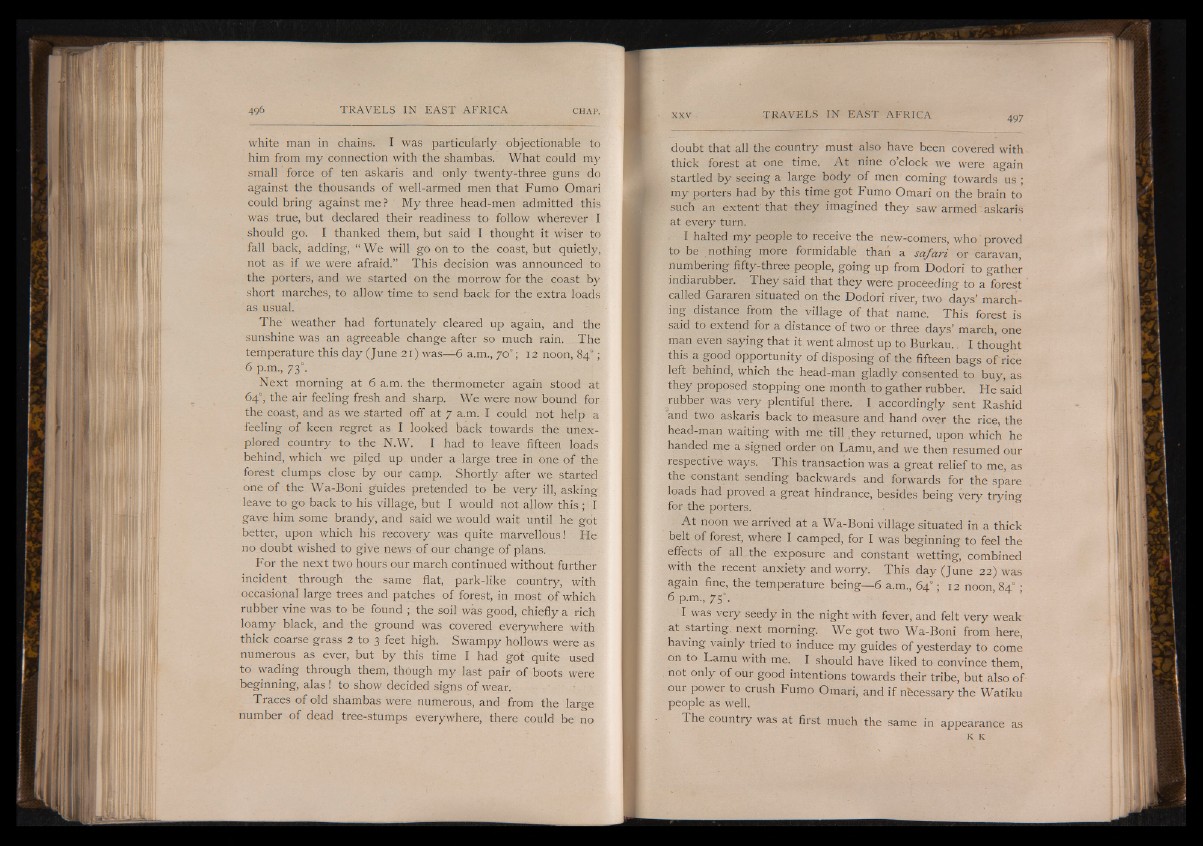
white man in chains. I was particularly objectionable to
him from my connection with the shambas. What could my
small force of ten askaris and only twenty-three guns do
against the thousands of well-armed men that Fumo Omari
could bring against me ? My three head-men admitted this
was true, but declared their readiness to follow wherever I
should go. I thanked them, but said I thought it wiser to
fall back, adding, “ We will go on to the coast, but quietly,
not as if we were afraid.” This decision was announced to
the porters, and we started on the morrow for the coast by
short marches, to allow time to send back for the extra loads
as usual.
The weather had fortunately cleared up again, and the
sunshine was an agreeable change after so much rain. The
temperature this day (June 21) was— 6 a.m., 70°; 12 noon, 84°;
6 p.m., 730.
Next morning at 6 a.m. the thermometer again stood at
64°, the air feeling fresh and sharp. We were now bound for
the coast, and as we started off at 7 a.m. I could not help a
feeling of keen regret as I looked back towards the unexplored
country to the N.W. I had to leave fifteen loads
behind, which we piled up under a large tree in one of the
forest clumps close by our camp. Shortly after we started
one of the Wa-Boni guides pretended to be very ill, asking
leave to go back to his village, but I would not allow this ; ;I
gave him some brandy, and said we would wait until he got
better, upon which his recovery was quite marvellous! He
no doubt wished to give news of our change of plans.
For the next two hours our march continued without further
incident through the same flat, park-like country, with
occasional large trees and patches of forest, in most of which
rubber vine was to be found ; the soil was good, chiefly a rich
loamy black, and the ground was covered everywhere with
thick coarse grass 2 to 3 feet high. Swampy hollows were as
numerous as ever, but by this time I had g o f quite used
to wading through them, though my last pair of boots were
beginning, alas ! to show decided signs of wear.
Traces of old shambas were numerous, and from the large
number of dead tree-stumps everywhere, there could be no
doubt that all the country must also have been covered with
thick forest at one time. A t nine o’clock we were again
startled by seeing a large body of men coming towards us ;
my porters had by this time got Fumo Omari on the brain to
such an extent'that they imagined they saw armed askaris
at every turn.
I halted my people to receive the new-comers, who proved
to be nothing more formidable than a safari or caravan,
numbering fifty-three people, going up from Dodori to gather
indiarubber. They said that they were proceeding to a forest
called Gararen situated on the Dodori river, two days’ marching
distance from the village of that name. This forest is
said to extend for a distance of two or three days’ march, one
man even saying that it went almost up to Burkau. I thought
this a good opportunity of disposing of the fifteen bags of rice
left behind, which the head-man gladly consented to buy, as
they proposed stopping one month to gather rubber. He said
rubber was very plentiful there. I accordingly sent Rashid
and two askaris back to measure and hand over the rice, the
head-man waiting with me till .they returned, upon which he
handed me a signed order on Lamu, and we then resumed our
respective ways. This transaction was a great relief to me, as
thè constant sending backwards and forwards for the spare
loads had proved a great hindrance, besides being very trying
for the porters.
At noon we arrived at a Wa-Boni village situated in a thick
belt of forest, where I camped, for I was beginning to feel the
effects of all the exposure and constant wetting, combined
with the recent anxiety and worry. This day (June 22) was
again fine, the temperature being— 6 a.m., 64° ; 12 noon, 84° ;
6 p.m., 75°.
I was very seedy in the night with fever, and felt very weak
at starting, next morning. We got two Wa-Boni from here,
having vainly tried to induce my guides of yesterday to come
on to Lamu with me. I should have liked to convince them,
not only of our good intentions towards their tribe, but also of
our power to crush Fumo Omari, and if nhcessary the Watiku
people as well.
The country was at first much the same in appearance as